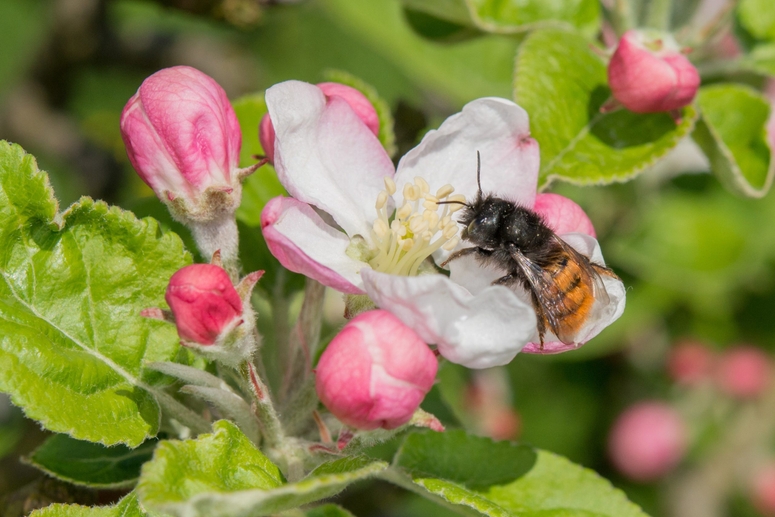New Dorset Wildlife Trust project report demonstrates how easy, impactful and effective biodiversity monitoring can be, using the right tech
Food producers needing to demonstrate sustainability stewardship to achieve the LEAF Marque accreditation required by major supermarkets, can now access quick, easy and clear biodiversity data with thanks to Polly.

The Dorset Wildlife Trust, a clear voice in the UK’s efforts for biodiversity conservation and habitat restoration, has, today, released a very encouraging report on its ‘24/7 Biodiversity Monitoring’ project, a collaborative project funded through Innovate UK and Defra examining the impact of different systems for biodiversity and species monitoring.
Trialled alongside three other project partners’ systems on a large organic farm in Dorset, AgriSound’s Polly AI insect listening device has been proven as an impactful and insightful piece of technology, with the benefits to biodiversity impartially measured, and shown to be a powerful tool for accurately gathering efficiently outputting real-time data about pollinators and pollination.
This means that, not only do our devices offer ways and means to benefit biodiversity, they also accurately provide the environmental data crucial for reporting on the impact a business or organisation has on nature.
Indeed, Polly AI insect listening devices can provide accurate real-time data to support accreditations such as the LEAF Marque – crucial for food producers looking to supply major supermarkets who desire sustainability reporting. Information includes pollinator activity, health and habitat preference, temperature and humidity, and indicators for natural pollination interventions to increase crop yield.
The Hemsworth Farm project
One of four systems researched by Dorset Wildlife Trust’s project, deploying AgriSound’s Polly devices on-site, has given Hemsworth invaluable insights into pollinator activity, a crucial aspect of sustainable agriculture. Our remote solar powered devices, equipped with fully automated AI bioacoustic technology, meticulously measure wing beat frequency to detect honeybees and bumblebees, providing farmers with real-time data on pollinator presence and abundance.
Hemsworth has been able to determine that the farm’s Sanfoin crop habitat is the one resulting in the highest pollinator activity, accounting for 21.6% of total pollinator activity. This can be attributed to its rich nectar compared to the other environments, including permanent pastures and herbal leys. The Polly devices also take into account other key factors such as temperatures and humidity and crop type to understand influential factors for local pollinators – a factor becoming increasingly important in environmental monitoring.
Results like this translate into tangible benefits for farmers, not only in understanding how to protect local biodiversity and maximising the crop yield benefits of taking good care of pollinators, but also for those looking to supply retailers such as supermarkets requiring sustainability accreditations such as LEAF (Linking Environment and Farming). AgriSound’s Polly devices serve as a powerful tool to provide the reporting data demonstrating farmers’ commitment to environmental sustainability.
Polly’s potential proven
The methodology outlined in the Dorset Wildlife Trust’s report also highlights the meticulous approach AgriSound takes in deploying Polly devices. From careful habitat analysis to regular monitoring of data collection, every step is designed to maximise the accuracy and reliability of the gathered information.
By being able to identify key habitats with higher pollinator activity, the data Polly devices can provide allows farmers to tailor their land management practices and build biodiversity hotspots that feed into the health of pollinators. Being able to monitor changes in pollinator abundance and implement natural interventions is an important part of sustainable farming methods, again, benefitting biodiversity and naturally facilitating higher crop yield.
The evidencing data Polly is able to provide can be used to feed into the increasing number of necessary environmental reporting frameworks, and in addition to helping those seeking to gain LEAF Marque, many organisations use AgriSound’s data to help them meet other relevant environmental standards such as TNFD (Taskforce on Nature related Financial Disclosures), BNG (Biodiversity Net Gain), ESG (Environmental, social and corporate governance) and CSRD (Corporate Sustainability Reporting Directive).
Where to next?
You can read the Dorset Wildlife Trust’s full report here and discover more about the biodiversity and sustainable stewardship reporting AgriSound’s data can support through demonstrating environmental altruism while also capitalising commercially.
Do you think achieving LEAF Marque accreditation could help your next move? We’d love to see how we can help you benefit from the data reporting our Polly devices can feed into.
If you want to do business a favour as well as the planet, by harnessing the power of our AI bioacoustic data, do get in contact at [email protected]
